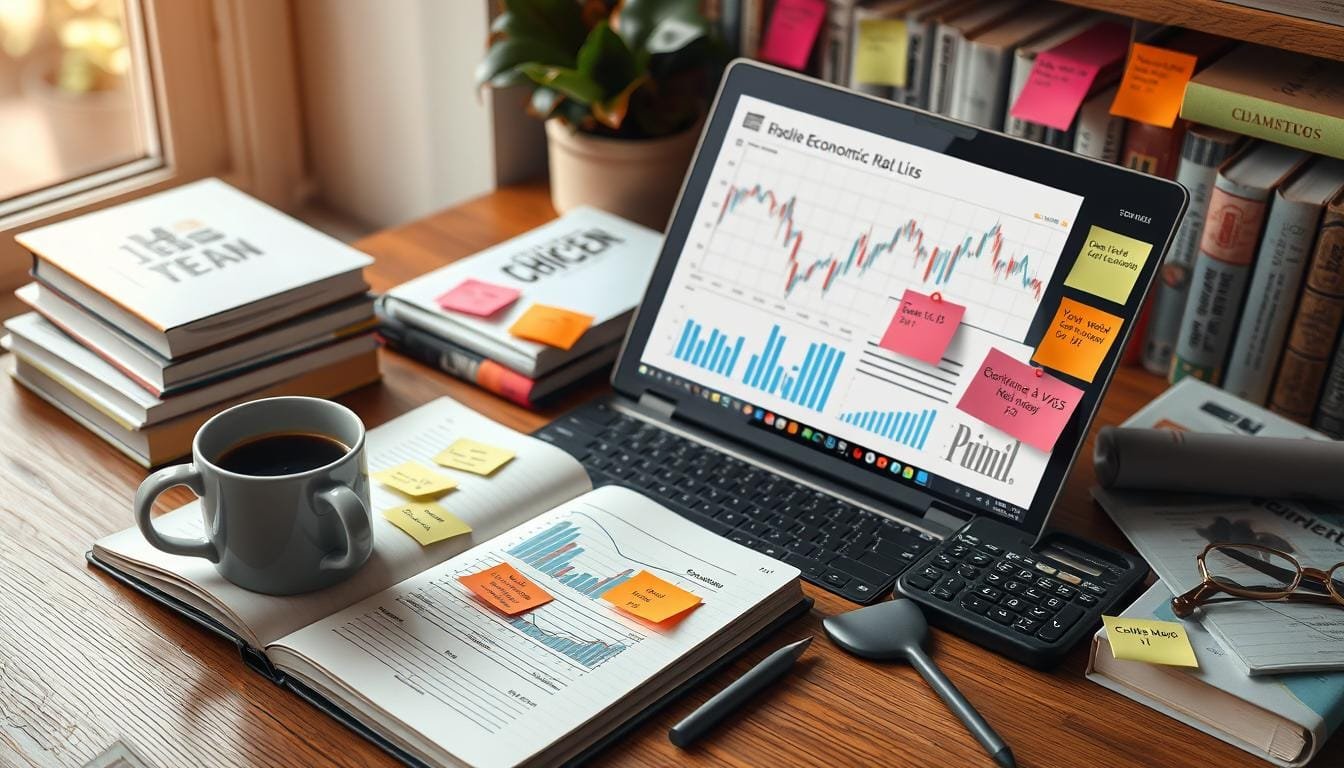Are we using the best strategies when we look back at our economic assignments? Or are we missing important insights that could change how we understand and perform?
For many, economic studies seem difficult. They often involve complex math and lots of data from sources like the Economic Report of the President and the Statistical Abstract of the United States. Yet, with a structured approach, we can learn a lot from these assignments. They can greatly improve our understanding and academic results. Let’s see how to review and enhance our work in economics to do better in the subject.
Key Takeaways
- Economic assignments require a clear, methodical approach because they use math and data.
- Using reliable sources like Census data and academic journals makes our research stronger.
- Managing time well, such as splitting revision into four sessions, helps us learn better than just cramming.
- Using active recall methods, such as flashcards, can boost how much we remember by up to 50%.
- Taking regular breaks while studying can increase our memory and thinking skills by 20%.
Understanding the Importance of Revisiting Economic Assignments
Economics is tough with its complex theories and concepts. That’s why revisiting economic assignments matters so much. To really get the hang of ideas like Gross National Product (GNP), and employment levels, you have to go over them more than once. Going back to these assignments helps make these ideas clear.
When we talk about economics, we mean both the small scale (micro) and the big picture (macro). When we apply big-picture ideas, like those about employment, it helps us see the large-scale economic patterns. This is why revisiting is essential: it makes these theories familiar, so we can use them in various situations.
Economics explores how people interact and live, shaping how we see economic actions in different situations.
Going over our assignments again makes sure we remember economic aspects clearly, from goods prices to how much countries spend.
Let’s talk about the main reasons we should go back to our economic assignments:
- Going over assignments again helps make sure we understand basic economics, like scarcity, opportunity cost, and how markets balance.
- By reviewing past assignments often, we can relate what we learned to real life. This sharpens our ability to think things through.
- Economic ideas can get complicated, with parts like how goods are made, shared, and the role of government spending. Revisiting assignments clears up confusion and gives a deeper insight.
Looking at assignments again fits with a bigger way of learning called threshold concepts. It changes our basic understanding to a more advanced one. This is why revisiting is essential. It encourages us to dive deeper and really get involved with what we’re learning.
In essence, revisiting economic assignments is key to mastering the subject. It lets us thoroughly get back into economic ideas and theories, strengthening our grasp and how we apply them. This prepares us not just for school, but for making smart economic choices in daily life and work.
Effective Study Strategies for Economic Assignments
To master economic assignments, using active study techniques is key. Effective study strategies for economics need you to dive deep into the subject. This means making detailed study guides, explaining concepts out loud, and applying theories to the real world.

A basic method is following the Study Cycle, which has important steps:
- Previewing the material before class.
- Attending and actively participating in classes.
- Reviewing notes after each class session.
- Studying the material in-depth.
- Checking understanding through self-assessment.
The Study Cycle creates a great learning method. It helps students plan their study time better. Plus, spreading out your study sessions—known as distributed practice—really helps you remember more. Experts say that spending 75% of your time drilling deeply and 25% reviewing boosts grades.
Lack of sleep and poor eating can make it hard to focus. Up to 30% of students say tiredness hurts their grades. That’s why getting enough sleep and eating right are so important. Also, you shouldn’t study for more than 4-6 hours a day to keep information fresh and avoid feeling overwhelmed.
Visualization helps a lot too. Around 80% of top achievers use visual aids, which shows it’s effective. Practicing with past exams gets you used to the question formats, leading to a 20-30% better performance on tests.
Quick note reviews, taking up 10% of study time, can raise retention by up to 25%. Having a quiet place to study can make you 50% more focused and improve memory. Reading notes out loud helps around 60% of students remember better.
Asking open-ended questions about the material boosts your understanding significantly. This approach can improve your thinking skills by 40%.
In short, active study techniques are various ways to solidify knowledge. Effective study strategies for economic assignments include the Study Cycle, distributed practice, visualization, and a good study space. These approaches improve grades and make learning more rewarding.
“Success is the sum of small efforts, repeated day-in and day-out.” – Robert Collier
| Study Method | Impact on Performance |
|---|---|
| Distributed Practice | +30% retention |
| Utilizing Old Exams | +20-30% familiarity |
| Quiet Study Environment | +50% focus |
| Reading Aloud | +60% memory retention |
| Open-Ended Questions | +40% critical thinking |
How to Manage Your Time Effectively
Managing time well is key to doing well in economics. A Study Schedule helps set specific study times and breaks tasks into smaller parts. We’ll look at strategies to use time well and stop procrastinating.
“Time management is probably the single most important skill that will help a student succeed,” according to Academic Advisor Colin Deyman.
First, we need to change bad study habits quickly. Having shorter study times with clear goals helps us stay focused. This way, we don’t get too tired.

Using tools like calendars helps us manage our time over many days. This makes sure we always meet deadlines. Planning our daily activities helps us know what to do next.
Here are the benefits of good time management:
- More free time because we finish tasks quicker.
- Better job chances because employers like people who manage time well.
- We get more done faster by setting SMART goals.
- We focus better and do better work.
Not putting things off is another key point. Distractions like social media can waste time and make us stressed. By setting time limits for tasks, we work more efficiently. Breaks also help keep our focus sharp.
Finally, having support from friends, family, and advisors is crucial. Talking to them helps us stay on track and not make excuses. Rewards for finishing tasks help keep us motivated and balanced.
With a Study Schedule, we use our 24 hours better and avoid bad time management. Let’s use our time well, plan carefully, and do well in our economics assignments.
Can I Go Back to Achieve Assignments for Economics?
Absolutely, revisiting past work is not only allowed but very helpful. When we look at our old assignments, we learn more about economics. It helps us see what we need to work on and use advice in a good way.

One big plus of reviewing past work is using feedback well. Feedback shows us what we don’t understand yet. This lets us get better and ready for what comes next. Working with real data and studies also helps a lot.
The Achieve platform is great for going back to our work. It works well with iClicker for quick polls, quizzes, and checking who’s there. Its automatic grading for chapter questions and homework helps us see where we need to improve.
Here’s a quick look at tools that help with economics assignments:
| Features | Description |
|---|---|
| LearningCurve | Offers individualized question sets tailored to student performance, ensuring personalized learning experiences. |
| Instructor Activity Guides | Detail activity type, class time, and implementation effort for structured engagement. |
| Gradebook | Allows educators to easily monitor both class-wide and individual student performance. |
| 11-step Roadmap | Designed for self-education in economics, ideal for long-term improvement. |
Using these tools to revisit assignments makes our learning better. It turns our study time into a process where we keep improving. This way, we really understand and master economic ideas.
Conclusion
Reviewing economic studies shows that a complete method of reviewing work, using good study techniques, and managing time well helps learning last. These components help students dive deep into the subject and reach their academic economics goals.
Understanding economic principles is key. This includes the Federal Reserve’s role in monetary policy and events like the Great Depression. The role of stock markets and banks in U.S. financing shows the complexity of economics. Learning from past assignments offers real-world insights, aiding in academic and career success.
These practices let us explore economic growth, population trends, and financial economics better. Seeing how lower birth rates can boost child health or how rapid population growth impacted countries helps. For more on how this affects transit projects, see the feasibility and benefits of expanding nationally. A complete academic strategy helps us learn more and prepares us for a successful career. This way, we reach great academic heights in economics, which supports continuous learning and success.
FAQ
Why is revisiting economic assignments important for improvement?
Going back to economic assignments is key. It lets us dive into complex topics again, making sure we really get it. This strengthens how we grasp and use economic concepts in different situations.
What are some effective study strategies for economics?
Good ways to study economics involve making guides and talking concepts through out loud. Using examples from the real world helps too.
Following the Study Cycle—preview, attend, review, study, and check—gives a complete learning journey. It’s better to spread out studying over time, rather than last-minute all-nighters.
How can we manage time effectively when working on economic assignments?
To manage time well, make a detailed study plan with specific study times. Break tasks into smaller parts. Tackling procrastination by setting short, achievable goals helps keep up productivity and focus.
Can I revisit and edit previous Achieve assignments for economics?
Yes, looking at and tweaking past Achieve assignments is smart. It helps deepen understanding. Using feedback to spot weak spots lets us fix them. This makes us more ready for what comes next.
How can we utilize academic resources effectively in economic studies?
Making the most of academic resources boosts our learning. Using data, economic texts, and tools helps cement our understanding. This prepares us better for advanced economic classes.
